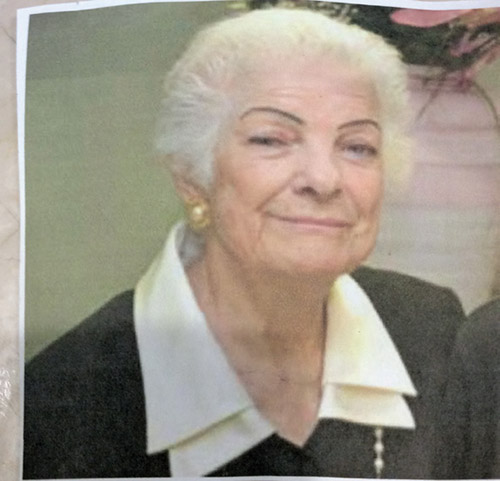
Marta Felberbaum, by all appearances an ordinary woman, was anything but ordinary. Felberbaum, who passed away on April 7 of this year, was born in Czechoslovakia on June 21, 1928, and went on to live quite an extraordinary life.
As a young child, she and her family lived well in Czechoslovakia, yet when her parents were presented with the opportunity to move to what was then Palestine, they took the family and left for parts unknown. A year later, facing financial hardship, the Felberbaum family considered moving to America, but a cousin who was already there told Marta’s parents that “the streets are treif,” so the family returned to Czechoslovakia in 1942, thus sealing their fate.
Marta’s family ultimately was sent to Auschwitz, where she spent more than a year before she and her sisters were liberated. At one point, she and her mother were brought before the notorious Josef Mengele. That moment was one that haunted Marta for the rest of her life.
“Marta felt guilty for letting go of her mother’s hand. She would say she should not have let go,” said Olga Jaeger of Fair Lawn, who met Marta in a DP camp located near Bayern, Germany. The two became friends there, and their close friendship continued after they came to America.
Despite her guilt, and even in Auschwitz, Marta was determined to live. Debra Shapiro, a Fort Lee resident, was a neighbor and friend of Marta’s. Shapiro, who would often spend Shabbat afternoons with Marta, appreciated hearing her neighbor’s stories about her experiences. “One starry night, she saw the dead bodies of hundreds of girls, and she looked up in the sky and said, ‘God, I want to live. I don’t want to die.’”
One trait of Marta’s that Jaeger clearly recalls is how genuine she was. “If Marta accepted you as a friend, then she cared for you. She would call every day when you were sick to check on you,” Jaeger remembered.
While Marta and her sisters were liberated in 1945 by the Russians, their struggles were far from over. “Marta heard that 60 miles away they were giving money and clothes away. She hopped on a moving train to get the help but she went on the wrong train,” said Shapiro. Marta had to switch trains four times before finally getting the needed assistance, which she brought back to share with her sisters.
After a few years in the DP camp, Marta came to America in 1948. Upon arrival, Marta recognized that she had no one to take care of her and would have to fend for herself financially. According to Shapiro, she was more than capable of this. “She was wise at business even from a young age.”
Marta had learned business skills in Czechoslovakia as a child, and those skills served her well throughout her lifetime. At the age of 10, Marta had rented out her mother’s scale to a local fruit store to earn extra money. After the war, she went back to Czechoslovakia and was able to collect back rent from the Russians who had taken over the storefronts her parents had owned. She also sold shopping bags, which she had her cousin make out of newspapers, to store owners in Czechoslovakia. Yet, she had had no formal training and had no specific skills. When she came to New York, she got a job knitting even though she didn’t know how. She assured her boss she would learn quickly, and she did. Later Marta worked in the administration office at Columbia College, which she tolerated for the pension but did not care for as she felt the college was anti-Semitic.
In the early 1950s, Marta met her husband, Leslie, who proposed to her at the end of their first date. The couple was married for 54 years and enjoyed a loving and caring marriage. They are survived by their son.
The Felberbaums lived in the Bronx, briefly in Los Angeles and, ultimately, in Fort Lee in the Atrium building. Marta insisted they live there, and had saved carefully to afford such a place, so that they could be close to a shul. Judaism was very important to Marta and, according to Shapiro, “She kept everything her parents did—davening, kashrut and tzedakah. She had to be in shul on time.”
Israel was also near to her heart, and Jaeger said, “She lived for Israel and felt that if the country would have existed during the Holocaust, this would not have happened to us.”
Marta insisted on telling her Holocaust story. According to Shapiro, “She felt it was important to pass along her knowledge to the younger generation so they should know and not be afraid. She wanted them to have courage.”
Marta and Jaeger often went together to Jewish day schools to speak about their experiences during and after the war. Marta particularly enjoyed speaking at TABC. Jaeger said, “I think she liked it there because seeing an all-boys’ Orthodox day school made her happy. She was very observant.”
Till the end, Marta maintained her zest for life. A proper woman, who cared about her appearance and would not go anywhere without her high heels, she was far from ordinary. Despite her trying times, “She believed everything is in God’s hands, and never lost her faith nor her religious footing.”
By Larry Bernstein
Larry Bernstein is a Bergen County-based freelance writer. To learn more about him and his services, visit: http://larrydbernstein.com/.








